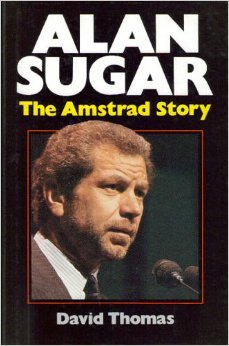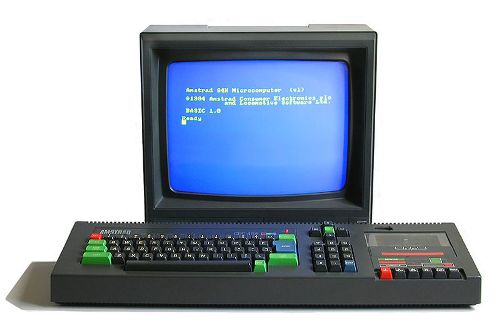
Following on from yesterday, here's the guy responsible for the Amstrad PPC512:

You'll notice he's dressed, "a bit funny," as he himself might say. To all you non-Brits out there, the clothes he's wearing might be described as the trappings of true success, and that's what he, and others like him, wear on those special occasions in the House of Lords where the ebb and flow of its itinerant denizens stops ebbing and flowing while they remind themselves and everybody else how lucky we Brits are to live and work in a country that values tradition. How much longer that tradition will continue to be valued is very much open to question, but let's save that one for another time.
You might not be too surprised to know that many Brits consider the House of Lords to be an anachronism worth destroying. And it must be true, because various political commentators have been telling us for years how much better off we'd all be if we replaced the House of Lords with another House of Lords and called it a Senate, or something similar, and how that would solve all our problems. Hooray!!! Total rubbish, of course, as any perusal of the World's political systems will tell you.
And Alan Sugar, in my opinion, is concrete proof that our system works.
"Oh no," I hear you cry. Dave's an Alan Sugar fanboy. Sorry to disabuse you of your opinion, but I've never met him, so I haven't got a clue what he's like when the cameras stop rolling. But I have read this:

Published back in 1991, when he was 'just' an extremely successful businessman and not the man of influence many think they know today. It's a very readable biography which illustrates what it takes to be like him. A bloody hard worker who employed other bloody hard workers to work bloody long hours and get paid bloody well for it. And if you don't do that, you're out, or 'fired' as he likes to say these days. There's nothing new about that, as other business related biographies I've read have shown me. And I'm taking it at more or less face value because even though it's a simplified portrayal, there is some criticism in there, too. He's clearly not an easy person to get along with and he does make mistakes. In other words, a surprisingly ordinary guy, extraordinary story or not.
Amstrad is short for Alan M Sugar Trading and that, as the book explains, was a common naming practice for traders that supplied London's Tottenham Court Road shops back in the sixties. If you walk down that road today, you won't see all that much. If you'd had the privilege of walking down it back in the 80's you'd have seen a fair few windows of hi-fi's and computers. I get the impression that another 20 years earlier would have provided a more full on electronics 'this and that' shopping experience. Great. But how did any of that lead Alan to where he is today? Floating his company on the stock exchange was certainly a big help. You lose some control but get an awful lot of cash. Kind of like winning the lottery but a lottery where you have some control over the odds. But that's not enough. You need to get famous, and a good way for a businessman to do that back in the 80's, was to make something like this:

That was released back in 1984 and would have set you back 299 quid. More on it here: Amstrad CPC-464
It looks a bit of a joke or at least somewhat idiosyncratic, and certainly if I'd bought that instead of the micro I did actually buy, it would have been less likely to work today. But then my micro cost another hundred and £399 was a lot of cash back then. Enough cash to buy genuine quality. And I still needed extra on top for a monitor.
In other words, that machine was easy to buy because you got everything all-in for a good price, just like those old music centres. It was a tough decision, but I made the right one for me and sometimes I'll dig out my BBC Micro and write a recursive function or two. Not many early 80's micros allow you to write that kind of code and the CPC-464 wasn't one of them. Nonetheless, having just read through it's command list, Locomotive BASIC on the CPC-464 was still an excellent BASIC for it's day. Certainly much better than those of the Sinclair and Commodore machines it actually competed with. And in some ways better even than the very highly regarded BBC BASIC, too.
So, no. It looks like a joke, but it wasn't and that's not surprising because it's pretty clear from that book that Lord Sugar never jokes about business. There's too much money and people's lives on the line to be messing about. That was a serious machine for it's class.
So, what's so serious about those coloured buttons? Apparently, Alan liked his music centres to look flashy. A 'mugs eyeful', according to that book. And I guess that's what we're seeing here. A mugs eyeful for people who weren't mugs, conceived by a guy who's no mug and who kept on making mugs eyefuls, and that's why he's in the House of Lords. I'm not sure how many other countries there are where that would have happened to a guy like Alan, or even how many other countries where a guy like Alan would be allowed to even exist. A guy who wasn't born with a silver spoon in his mouth and didn't kill people to get one.